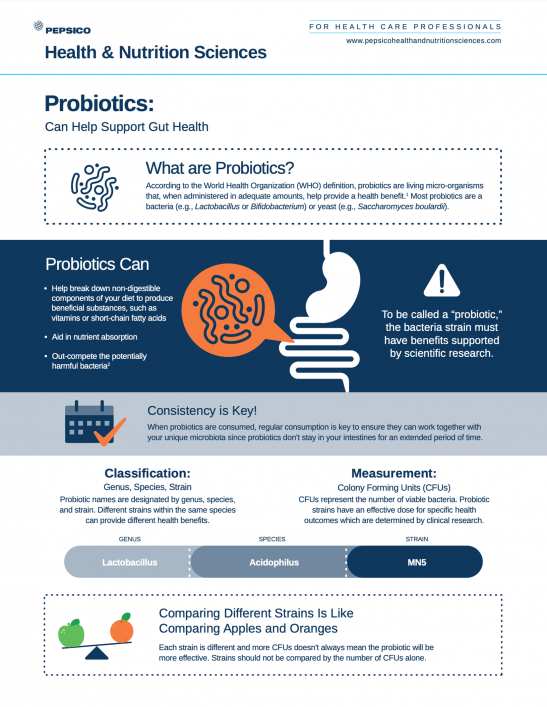Probiotics: Can Help Support Gut Health
Please click on "Click to view" or on the image to the right to download this resource to use with your patients and clients!
Description: Understand the role of probiotics in supporting gut health.
- Probiotics & digestive health
- What probiotics are and how they work
Probiotics: Can Help Support Gut Health
What are Probiotics?
According to the World Health Organization (WHO) definition, probiotics are living micro-organisms that, when administered in adequate amounts, help provide a health benefit.1 Most probiotics are a bacteria (e.g., Lactobacillus or Bifidobacterium) or yeast (e.g., Saccharomyces boulardii).
Probiotics Can:
- Help break down non-digestible components of your diet to produce beneficial substances, such as vitamins or short-chain fatty acids
- Aid in nutrient absorption
- Out-compete the potentially harmful bacteria
To be called a “probiotic,” the bacteria strain must have benefits supported by scientific research.
Consistency is Key!
When probiotics are consumed, regular consumption is key to ensure they can work together with your unique microbiota since probiotics don’t stay in your digestive system for an extended period of time.
What is the difference between types of probiotics?
Probiotic Classification: Genus, Species, Strain
Probiotic names are designated by genus, species, and strain. Different strains within the same species
can provide different health benefits.
Measuring Probiotics: Colony Forming Units (CFUs)
CFUs represent the number of viable bacteria. Probiotic strains have an effective dose for specific health outcomes which are determined by clinical research.
Comparing Different Probiotic Strains
Each strain is different and more CFUs doesn't always mean the probiotic will be more effective. Strains should not be compared by the number of CFUs alone.
All Probiotics Are Live and Active Cultures, but Not All Cultures are Probiotics.
What is Fermentation?
- A metabolic process in which micro-organisms convert sugar to organic acids and alcohol
- ‘Live and active cultures’ are required for bacterial fermentation
- Some fermented foods are further processed (ex. baked, pasteurized) which kills the active cultures
Not all fermented foods contain probiotics – check the label to make sure probiotics are listed!
Do Fermented Foods Contain Probiotics?
Maybe. Scientific evidence that shows the specific strain to confer a health benefit is required to be considered a probiotic.
Key Takeaways about Probiotics
Foods and beverages with probiotics should be delivered at the right amount of the right strain to provide a health benefit.
Since ‘probiotics’ are not defined by the Food and Drug Administration, PepsiCo follows the internationally endorsed scientific definition by the WHO. We require that our products containing probiotics meet this definition.
PepsiCo and Probiotics
PepsiCo expertly formulates and tests their products regularly to achieve the effective probiotic dose through the end of shelf-life.
Please click on "Click to view" or on the image to the right to download this resource to use with your patients and clients!
Reference
- Food and Agricultural Organization of the United Nations and World Health Organization. Health & nutritional properties of probiotics in food including powder milk with live lactic acid bacteria. WHO, (2001).
- International Scientific Association for Probiotics and Prebiotics; https://isappscience.org/for-consumers/learn/probiotics/
